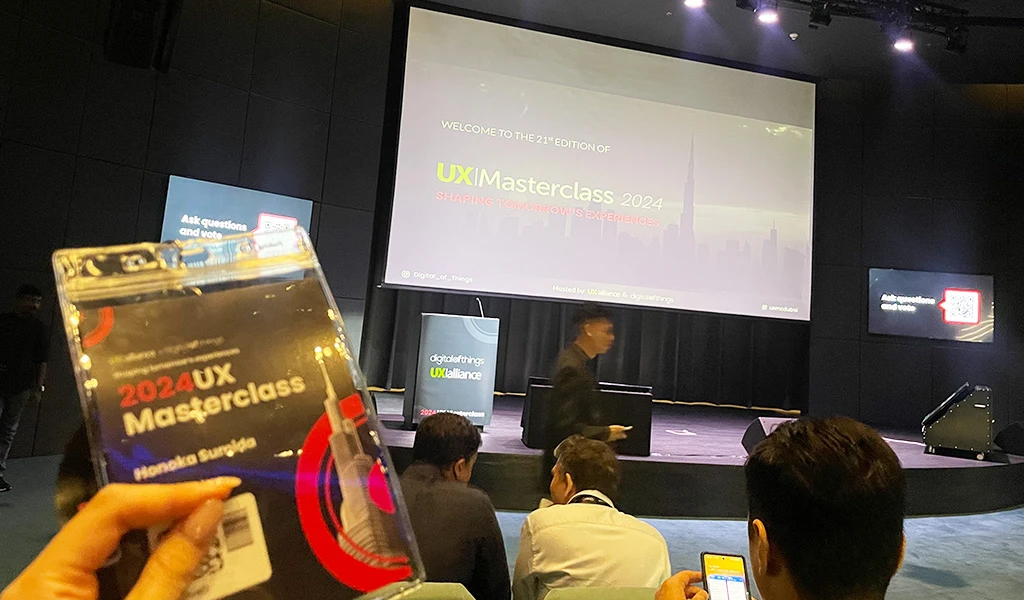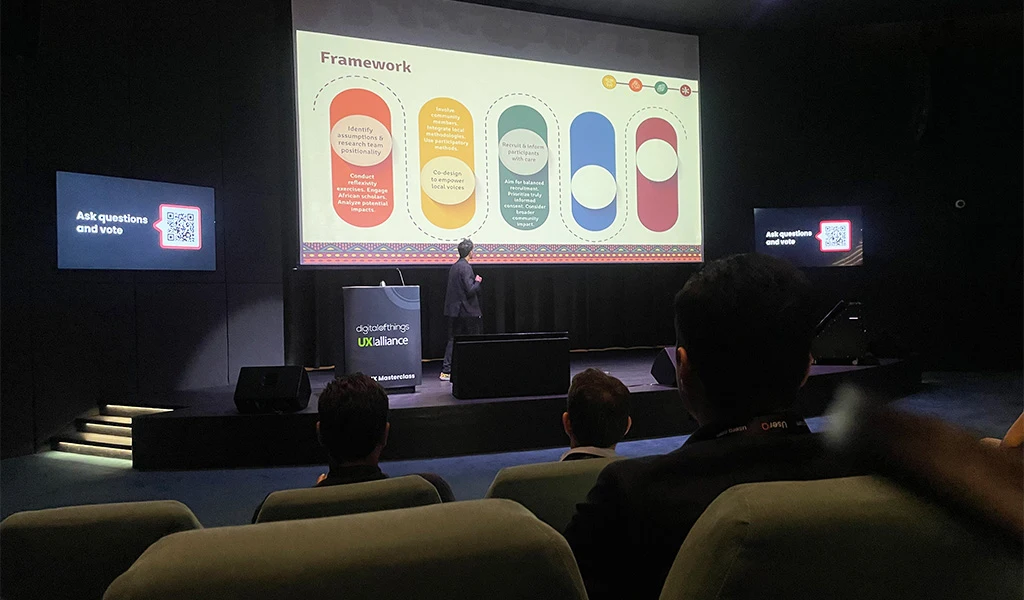UX Masterclass 2024 Dubai: Participation Report
SumidaUX ResearcherThe UX Masterclass is an international conference hosted annually by the UXalliance, a global network of UX research and design firms spanning 32 countries. Mitsue-Links joined the alliance in 2007 and presently collaborates with member firms worldwide on global research projects as well as participating in regular meetings to acquire and share information and know-how on both domestic and international and trends. As part of such activities, we actively participate in this international, annual UXalliance hosted conference.
This year's UX Masterclass was held in Dubai, United Arab Emirates (UAE), and, as the host country partner, was organized with the cooperation of Digital of Things. As last year, as representatives of Mitsue-Links, both myself and Ayumu Takeuchi, a fellow UX researcher, participated in the conference.
Each year, the conference has a theme – this time was 'Shaping Tomorrow's Experiences: UX in the Era of Evolving Customers'. As technology progresses, the expectations and perspectives of both clients, who commission our research work, and the users, who utilize the end services and products, are constantly changing. Against this backdrop, members from globally located partner companies presented both valuable perspectives and effective methods that UX professionals should adopt to stay ahead.

This column introduces several attended sessions.
Decolonizing LLMs: An Ethnographic framework for AI Alignment
Methods and considerations for properly localizing large language models (LLMs), which are widely used in technologies such as search and translation, were presented by members of Google - who are conducting joint research with their partners in the United States. Speakers mentioned how their project processes involved collaborating with local experts to account for the unique cultures of various countries, from data collection to analysis.
While the theme of this presentation was LLMs, I believe the same principles also apply to global surveys. The reason being that when conducting surveys across multiple countries, while it is necessary to standardize certain questions, some questions that may be routine for those in the West often do not align with the communication characteristics of Japanese people (for example, asking the question "please briefly articulate your own identity"). Therefore, I believe the perspectives introduced in this presentation offer valuable insights when facing such survey-related challenges in the future.

The Rise of the Ethical Consumer: UX for Values-Driven Customers
This presentation from Alraedah, a company based in Saudi Arabia, focused on the growing theme of "ethical consumption" - the consuming of products that address social issues such as working conditions or environmental considerations. The presentation emphasized that, assuming users desire ethical consumption, companies / designers should work together to understand these needs and design services and products accordingly.
While ethical consumption is still not as widespread in Japan compared to other countries, there is an increasing movement for prioritization among certain user groups. This presentation reinforced the idea that, as part of overall corporate efforts, considering ethical consumption and incorporating it into product design will likely become one of the key user-centric requirements in the future.
Expectations Evolve: Humans Don't Balancing Customer Needs with Human Capabilities
This presentation by US-based Bold Insight, discussed how, with technological advancements, user needs have become more diverse. However, it went on to note that users are not always able to clearly articulate these needs, so it is crucial for experts to interpret, analyze, and reflect user feedback in design.
When conducting research and receiving feedback such as "I want this feature" or "the design should be like this," many clients may desire to directly implement these suggestions. However, what is truly important is not the users' words themselves but understanding the underlying reasons behind their opinions. This point has been emphasized by our company in client-oriented seminars and workshops. Considering the argument that, while technology has advanced rapidly, human cognition and physical abilities remain unchanged, we realized the importance of further focusing on this aspect.
That concludes my presentation summaries.
Dubai, boasting a unique cityscape unlike those in Asia or Europe, is a place where advanced IT technology is deeply integrated into everyday infrastructure; the emirate also hosts numerous prominent IT companies. One particularly notable aspect was the well-developed system for receiving taxi receipts, riders can input their email addresses into a dedicated tablet to receive digital receipts. Given that many members from partner countries were unfamiliar with the UAE, the opportunity for researchers from various nations to share their individual findings and insights turned out to be a highly enriching experience.

We aim to continue enhancing our knowledge through understanding UX activities in various countries and exchanging ideas among researchers. Thank you for reading.
* UX Alliance was established in 2005 by leading UX companies from France, Germany, Spain, the UK, and the USA. As of November 2024, it has expanded to include 32 member countries. Its activities include hosting events like the UX Masterclass Conference, holding monthly information-sharing sessions, implementing initiatives to facilitate collaboration in global UX research, and ensuring the quality of research through various efforts. These activities collectively strengthen the cooperative framework among its members.
For more information on our services, timeframes and estimates, as well as examples of our work, please feel free to be in touch.
